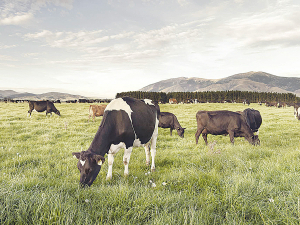Green no more?
OPINION: Your old mate has long dismissed the Greens as wooden bicycle enthusiasts with their heads in the clouds, but it looks like the ‘new Greens’ may actually be hard-nosed pragmatists when it comes to following voters.
 Between 2022 and 2023, total emissions from agriculture decreased 2.2%, including a 1.6% drop in dairy cattle emissions.
Between 2022 and 2023, total emissions from agriculture decreased 2.2%, including a 1.6% drop in dairy cattle emissions.
Emissions by dairy cattle decreased by 1.6% according to the latest NZ Greenhouse Gas Inventory report.
It shows that between 2022 and 2023, total emissions from agriculture decreased 2.2% which included a 1.6% drop in dairy cattle emissions due to a fall in dairy cow numbers.
DairyNZ general manager Farm Solutions & Policy, Dr David Burger, says this is part of a trend that has seen methane emissions from dairy cattle decrease by 4.11% since 2017. He says DairyNZ statistics show a 3.4% decrease in cow numbers - from 4.84 million in the 2021/22 season to 4.67 million in the 2022/23 season.
“But at the same time, average milk production per cow increased over this same period by 1.8%, up to 393kgMS from 386kgMS,” he says.
Dr Burger says our dairy farmers continue to work hard to improve onfarm efficiency and their environmental footprint, with the report reflecting that. He says improved productivity in farming has enabled agricultural emissions to fall since 2014 and DairyNZ is supporting that through a dedicated programme of work focused sharply on productivity, resilience and sustainability.
“This includes our work to advocate for fair and achievable climate targets and our research into solutions for farmers to understand and manage their emissions,” he says.
Dr Burger says work being done includes a focus on forage species to understand their effect on baseline methane emissions and the response to other mitigation technologies in a pasture-based system. He says they are supporting different delivery mechanisms for getting methane solutions into our grazing systems, working to improve the accuracy of emissions accounting, including the inventory and helping farmers understand their on-farm greenhouse gas emissions.
“New Zealand dairy farmers are among the world’s most emissions efficient, and research is key to helping them maintain that position. DairyNZ is investing in research alongside a range of partners to develop and test different mitigation solutions, ensuring they are fit for use in our pasture-based systems,” he says.
Burger says DairyNZ supports the independent panel on methane recommendation that the 2050 target be adjusted to 14-15% to 24% instead of the 24-47% that is currently legislated.
“Our long-held position on climate targets is that they should reflect the latest science and warming impact of methane, while also considering the mitigation tools and technologies available to farmers,” he says.
Global trade has been thrown into another bout of uncertainty following the overnight ruling by US Supreme Court, striking down President Donald Trump's decision to impose additional tariffs on trading partners.
Controls on the movement of fruit and vegetables in the Auckland suburb of Mt Roskill have been lifted.
Fonterra farmer shareholders and unit holders are in line for another payment in April.
Farmers are being encouraged to take a closer look at the refrigerants running inside their on-farm systems, as international and domestic pressure continues to build on high global warming potential (GWP) 400-series refrigerants.
As expected, Fonterra has lifted its 2025-26 forecast farmgate milk price mid-point to $9.50/kgMS.
Bovonic says a return on investment study has found its automated mastitis detection technology, QuadSense, is delivering financial, labour, and animal-health benefits on New Zealand dairy farms worth an estimated $29,547 per season.
OPINION: Staying with politics, with less than nine months to go before the general elections, there’s confusion in the Labour…
OPINION: Winston Peters' tirade against the free trade deal stitched with India may not be all political posturing by the…